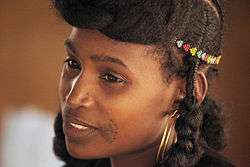Women in Niger
 Three young Wodaabe women in Niger photographed in 1997. | |
| Gender Inequality Index[1] | |
|---|---|
| Value | 0.709 (2013) |
| Rank | 151st out of 152 |
| Maternal mortality (per 100,000) | 590 (2010) |
| Women in parliament | 13.3% (2013) |
| Females over 25 with secondary education | 2.5% (2012) |
| Women in labour force | 39.9% (2012) |

Women in Niger are African women who live in or are from the Western African country known as Niger. These women belong to a population in which 98% are practitioners of Islam. Most of the laws adopted by the government of Niger to protect the rights of Nigerien women are most of the time based on Muslim beliefs.[2]
Among the women of Niger are the Hausa women,[3] the Wodaabe women, the Fulani women, the Zarma–Songhai women, the Gourmantche women, the Kanuri women, the Diffa Arab women, the Toubou women, and the Tuareg women. Hausa women of Niger can be identified by their dressing codes in which they wear wrappers called abaya made with colorful cloth with a matching blouse, head tie and shawl.
A public holiday in Niger known as the National Day of Nigerien Women (Journée nationale de la femme nigérienne) held annually on the 13th of May, commemorates a 1992 march by women in Niamey during the National Conference period, demanding greater involvement of women in national institutions. It is a holiday that became a "National Commemoration" on 25 November 1992.[4]
It is estimated that over one third of Nigerien women are in polygamous unions.
See also
References
- ↑ "Table 4: Gender Inequality Index". United Nations Development Programme. Retrieved 7 November 2014.
- ↑ "Islam and Women in Niger". The Board of Regents of the University of Wisconsin System. Retrieved 7 November 2013.
- ↑ "The Women of Niger". Worldwide Fistula Fund, Inc. Retrieved 7 November 2013.
- ↑ Commémoration de la Journée nationale de la femme: "Hommes et Femmes, tous unis, pour une meilleure représentation des femmes aux instances de prise de décisions", thème de la Journée. Ousmane Fatouma Saley, Le Sahel. 12 May 2009.
External links
| Wikimedia Commons has media related to Women of Niger. |
- Photograph of two Nigerien Tuareg women
- Nigerien women take the lead in implementing practices to protect their families during the nutrition crisis (At a glance: Niger) by Chris Tidey
- NIGER: Rape and beatings of women seen as “normal”
